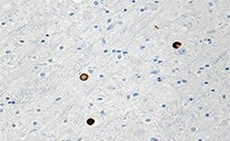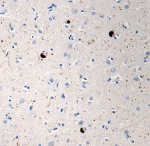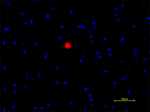- Clone
- P-syn/81A (See other available formats)
- Regulatory Status
- RUO
- Other Names
- Synuclein alpha-140, non-A4 component of amyloid, alpha-synuclein, isoform NACP140, non-A beta component of AD amyloid Parkinson disease (autosomal dominant, Lewy body) 4
- Isotype
- Mouse IgG2a, κ
- Ave. Rating
- Submit a Review
- Product Citations
- publications

-

IHC staining of α-synuclein deposits with biotin anti-α-Synuclein Phospho (Ser129) antibody (clone P-Syn/81A) on formalin-fixed, paraffin-embedded Parkinson's disease brain tissue. Following antigen retrieval using 70% formic acid, the tissue was incubated with the primary antibody at 5 µg/mL overnight at 4°C. HRP Streptavidin and DAB 2 Component with Stabilizer was used for the detection system followed by hematoxylin counterstaining, according to the protocol provided.
| Cat # | Size | Price | Quantity Check Availability | Save | ||
|---|---|---|---|---|---|---|
| 825704 | 100 µg | 358 CHF | ||||
α-synuclein is expressed principally in the nervous system, but it is also produced in other tissues, including the skin. In the brain, the protein is primarily neuronal, but it is also present in glia. Neuronal α-synuclein is concentrated in presynapt ic nerve terminals, interacts with plasma membrane phospholipids, and is also present in nuclei and mitochondria. At least three isoforms of α-synuclein are produced through alternative splicing. The most common isoform is a 140 amino acid-long transcript. Other isoforms includes, a-synuclein-126, lacking residues 41-54; and α-synuclein-112, which lacks residues 103-130. α-synuclein’s physiological role is poorly understood, but the protein has been implicated in regulating dopamine release and transport, synaptic vesicle clustering, and functioning as a SNARE-complex chaperone. α-synuclein fibrils are a major component of the intracellular Lewy bodies that are associated with Parkinson's disease, Lewy body dementia, and multiple system atrophy. α-synuclein is phosphorylated at low levels under normal physiological conditions whereas the majority of the protein is phosphorylated in Lewy bodies at S129.
Product DetailsProduct Details
- Verified Reactivity
- Human
- Antibody Type
- Monoclonal
- Host Species
- Mouse
- Immunogen
- This monoclonal antibody was raised against a synthetic peptide corresponding to amino acids 124 - 134 of α-synuclein, phosphorylated at Serine 129, and conjugated to KLH via a C-terminal Cysteine.
- Formulation
- Phosphate-buffered solution, pH 7.2, containing 0.09% sodium azide.
- Preparation
- The antibody was purified by affinity chromatography and conjugated with biotin under optimal conditions.
- Concentration
- 0.5 mg/mL
- Storage & Handling
- The antibody solution should be stored undiluted between 2°C and 8°C. Do not freeze.
- Application
-
IHC-P - Quality tested
- Recommended Usage
-
Each lot of this antibody is quality control tested by formalin-fixed paraffin-embedded immunohistochemical staining. For immunohistochemistry, a concentration range of 1.0 - 2.0 µg/ml is suggested. It is recommended that the reagent be titrated for optimal performance for each application.
- Application Notes
-
This antibody is effective in immunohistochemistry (IHC-P). Additional reported applications (for the relevant formats) include: Western blotting, immunohistochemisty on frozen tissue sections (IHC-F), and immunocytochemistry.
P-syn/81A is a mAb that is specific to alpha synuclein that has been phosphorylated on serine 129. -
Application References
(PubMed link indicates BioLegend citation) - Product Citations
-
- RRID
-
AB_2650683 (BioLegend Cat. No. 825704)
Antigen Details
- Structure
- α-synuclein’s canonical isoform consists of 140 amino acids, which consist of four 11-residue repeats containing the consensus sequence KTKEGV. α-synuclein has an apparent molecular mass of 14 kD.
- Distribution
-
Tissue distribution: primarily nervous system, but lower expression in other tissues such as skin.
Cellular distribution: cytoskeleton, cytosol, lysosome, mitochondria, nucleus, plasma membrane, and extracellular. - Function
- The function of α-synuclein in the healthy brain is currently unknown.
- Biology Area
- Cell Biology, Neurodegeneration, Neuroscience, Protein Misfolding and Aggregation
- Molecular Family
- α-Synuclein, Phospho-Proteins
- Antigen References
-
1. Mor DE, et al. 2016. Neurobiol Dis. 88:66. PubMed
2. Jucker M, Walker LC. 2013. Nature. 501(7465):45.
3. Bartels T, et al. 2011. Nature. 477(7362): 107. PubMed
4. Devine MJ, et al. 2011. Mov Disord. 26:2160. PubMed - Gene ID
- 6622 View all products for this Gene ID
- UniProt
- View information about alpha-Synuclein Phospho Ser129 on UniProt.org
Related Pages & Pathways
Pages
Related FAQs
- How many biotin molecules are per antibody structure?
- We don't routinely measure the number of biotins with our antibody products but the number of biotin molecules range from 3-6 molecules per antibody.
Other Formats
View All α-Synuclein Phospho (Ser12) Reagents Request Custom Conjugation| Description | Clone | Applications |
|---|---|---|
| Purified anti-α-Synuclein Phospho (Ser129) | P-syn/81A | IHC-P,ICC,IHC-F,WB,SB |
| Biotin anti-α-Synuclein Phospho (Ser129) | P-syn/81A | IHC-P |
| Alexa Fluor® 594 anti-α-Synuclein Phospho (Ser129) | P-syn/81A | IHC-P |
Compare Data Across All Formats
This data display is provided for general comparisons between formats.
Your actual data may vary due to variations in samples, target cells, instruments and their settings, staining conditions, and other factors.
If you need assistance with selecting the best format contact our expert technical support team.
-
Purified anti-α-Synuclein Phospho (Ser129)

IHC staining of purified anti-α-Synuclein Phospho (Ser129) a... -
Biotin anti-α-Synuclein Phospho (Ser129)

IHC staining of α-synuclein deposits with biotin anti-α-Synu... -
Alexa Fluor® 594 anti-α-Synuclein Phospho (Ser129)

IHC staining of Alexa Fluor® 594 anti-α-Synuclein Phospho (...

 Login / Register
Login / Register 









Follow Us